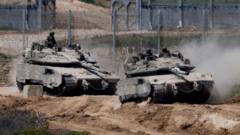The decision reflects a shift towards a sustained military presence in Gaza, raising concerns about humanitarian conditions amid ongoing conflict.
**Israel's Security Cabinet Greenlights Expanded Military Operations in Gaza**

**Israel's Security Cabinet Greenlights Expanded Military Operations in Gaza**
Israeli government takes decisive steps to intensify military efforts against Hamas, with implications for humanitarian aid and ongoing hostages.
The Israeli security cabinet has sanctioned an escalation of military actions against Hamas, aiming for sustained control over Gaza. Tens of thousands of reservists have been mobilized as part of this strategy to increase pressure on Hamas, with a focus on recovering Israeli hostages. This military operation is set to proceed following President Donald Trump's upcoming visit to the region.
Reports indicate that the cabinet is considering resuming humanitarian aid deliveries via private channels, following a two-month blockade that has resulted in severe food scarcity in Gaza. However, the UN and humanitarian organizations have opposed this plan, deeming it a violation of fundamental humanitarian principles and vowing not to cooperate.
Israeli Prime Minister Benjamin Netanyahu chaired the Sunday night security cabinet meeting, leading to a unanimous vote to gradually expand ground operations in Gaza over several months, according to local media reports. The initial phase aims to secure additional territories and widen the “buffer zone” along the borders with Egypt and Israel. This tactic, officials suggest, may provide Israel with an advantageous position for negotiations with Hamas concerning a potential ceasefire and the release of hostages.
An Israeli official noted that Netanyahu emphasized the distinct nature of the current offensive, transforming from sporadic raids to a more sustained occupation of territories. Security cabinet member Zeev Elkin commented that there remains a chance for a new release of hostages before President Trump's Middle East visit, suggesting a potential strategic leverage point with Hamas.
Despite these military maneuvers, critics have labeled the strategy flawed, with no progress on releasing any of the 59 hostages since the resumption of the offensive. Families of the hostages have expressed that the government’s approach prioritizes territorial gains over the freedom of those held captive, counter to public sentiment.
Furthermore, an Israeli political source confirmed discussions surrounding a potential humanitarian distribution initiative intended to weaken Hamas's hold on critical supplies. However, the Humanitarian Country Team (HCT) has raised alarms over Israeli efforts to restructure aid distribution, arguing that such changes would deny essential resources to Gaza’s most vulnerable populations and result in further displacement and danger.
Israel's military campaign against Hamas was initiated in response to a significant cross-border attack on October 7, 2023, which resulted in the deaths of approximately 1,200 individuals and the abduction of 251 hostages. The situation has deteriorated since then, with Gaza's health ministry reporting more than 52,535 casualties in the territory since the conflict began. International law obliges Israel to facilitate aid to Gaza, a responsibility the Israeli government claims it fulfills, despite widespread reports of dire shortages affecting the region's 2.1 million residents, many of whom remain displaced.
Reports indicate that the cabinet is considering resuming humanitarian aid deliveries via private channels, following a two-month blockade that has resulted in severe food scarcity in Gaza. However, the UN and humanitarian organizations have opposed this plan, deeming it a violation of fundamental humanitarian principles and vowing not to cooperate.
Israeli Prime Minister Benjamin Netanyahu chaired the Sunday night security cabinet meeting, leading to a unanimous vote to gradually expand ground operations in Gaza over several months, according to local media reports. The initial phase aims to secure additional territories and widen the “buffer zone” along the borders with Egypt and Israel. This tactic, officials suggest, may provide Israel with an advantageous position for negotiations with Hamas concerning a potential ceasefire and the release of hostages.
An Israeli official noted that Netanyahu emphasized the distinct nature of the current offensive, transforming from sporadic raids to a more sustained occupation of territories. Security cabinet member Zeev Elkin commented that there remains a chance for a new release of hostages before President Trump's Middle East visit, suggesting a potential strategic leverage point with Hamas.
Despite these military maneuvers, critics have labeled the strategy flawed, with no progress on releasing any of the 59 hostages since the resumption of the offensive. Families of the hostages have expressed that the government’s approach prioritizes territorial gains over the freedom of those held captive, counter to public sentiment.
Furthermore, an Israeli political source confirmed discussions surrounding a potential humanitarian distribution initiative intended to weaken Hamas's hold on critical supplies. However, the Humanitarian Country Team (HCT) has raised alarms over Israeli efforts to restructure aid distribution, arguing that such changes would deny essential resources to Gaza’s most vulnerable populations and result in further displacement and danger.
Israel's military campaign against Hamas was initiated in response to a significant cross-border attack on October 7, 2023, which resulted in the deaths of approximately 1,200 individuals and the abduction of 251 hostages. The situation has deteriorated since then, with Gaza's health ministry reporting more than 52,535 casualties in the territory since the conflict began. International law obliges Israel to facilitate aid to Gaza, a responsibility the Israeli government claims it fulfills, despite widespread reports of dire shortages affecting the region's 2.1 million residents, many of whom remain displaced.

















